Expert’s Rating
Pros
- High-end performance
- Premium build quality
- A great mechanical keyboard
- Excellent speakers
Cons
- Expensive
- Low display brightness
- No HDR for games
- No Ethernet jack
Our Verdict
The Alienware x16 R2 is a premium 16-inch gaming laptop at a premium price. But its mechanical keyboard and the highest-end hardware will cost you extra.
Price When Reviewed
$3,199
Best Prices Today: Alienware x16 R2
$3099.99
$3099.99
The Alienware x16 R2 is a high-end 16-inch gaming laptop. An Alienware representative told me this machine is Alienware’s “most premium ever.” It comes at a premium price, too — this is the kind of machine you pick if you want a polished experience with an all-metal chassis, mechanical keyboard, and high-end speakers. It’s not a value-focused gaming laptop that will give you the most gaming performance possible at the lowest price point. But if a more premium design is what you’re looking for, this might be the gaming laptop for you.
Looking for other options? Check out PCWorld’s roundup of the best gaming laptops.
Alienware x16 R2: Specs
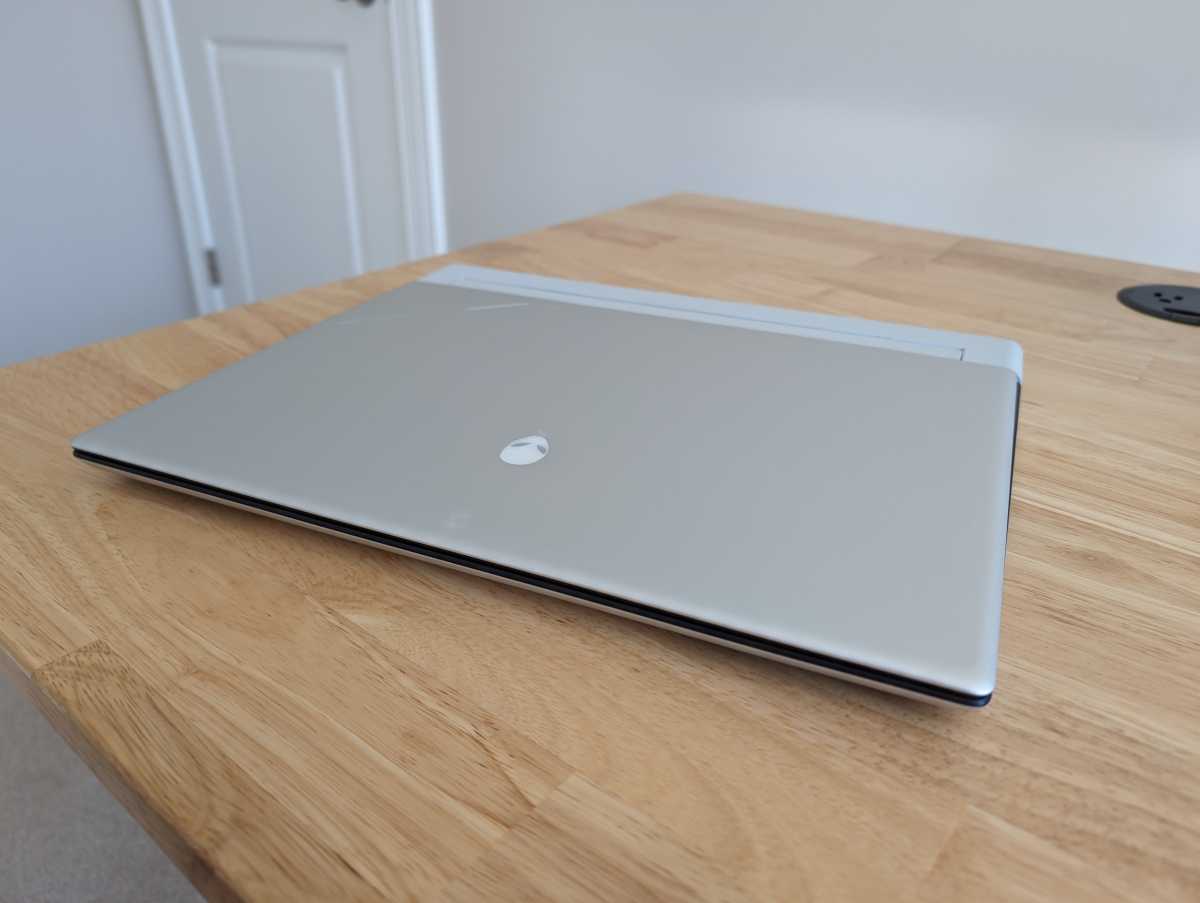
IDG / Chris Hoffman
The Alienware x16 R2 is a 16-inch gaming laptop with a lot of powerful hardware inside. Our review model had a high-end Intel Core Ultra 9 185H CPU, but the base model is also available with a Intel Core Ultra 7 processor 155H CPU. These are both Intel Meteor Lake CPUs, which means this laptop comes with the neural processing unit hardware that may become important to take advantage of AI features in Windows and other applications one day.
The model we reviewed had Nvidia GeForce RTX 4080 graphics hardware, but Alienware also offers a higher-end model with GeForce RTX 4090 hardware — or you can step down and choose an RTX 4060 or RTX 4070.
Alienware included 32 GB of RAM our review model, but the base model has 16 GB. Additionally, we had a machine 1 TB of solid-state storage, but you can get versions of this laptop that come with a built-in RAID — up to two 4TB storage drives for a combined 8TB of solid-state storage.
The Alienware x16 R2 we got our hands on had a mechanical keyboard with Cherry MX ultra low-profle switches, but the base model comes standard with an “Alienware X Series keyboard” — a more traditional laptop keyboard.
Finally, the laptop we reviewed included a 16-inch 2560×1600 resolution IPS display with a 240Hz refresh rate. Alienware told us you can also get this laptop with a 2220×1080 display with a blazing-fast 480Hz refresh rate.
- CPU: Intel Core Ultra 9 185H
- Memory: 32GB LPDDR5X, 7467MT/s
- Graphics/GPU: Nvidia GeForce RTX 4080
- Display: 16-inch 2560×1600 IPS display with 240Hz refresh rate
- Storage: 1TB M.2 PCIe NVMe SSD
- Webcam: 1080p webcam with HDR
- Connectivity: 1x Thunderbolt 4 (USB-C with Power Delivery and DisplayPort), 1x USB-C 3.2 Gen 2 with DisplayPort, 2x USB-A 3.2 Gen 1, 1x HDMI 2.1, 1x Mini DisplayPort 1.4, 1x combo headset jack, 1x microSD card slot, 1x DC power in
- Networking: Wi-Fi 7, Bluetooth 5.4
- Biometrics: IR camera for Windows Hello
- Battery capacity: 90 Watt-hours
- Dimensions: 14.36 x 11.41 x 0.73 inches
- Weight: 5.86 pounds
- MSRP: $3,199 as tested ($2099 base price)
Alienware x16 R2: Design and build quality
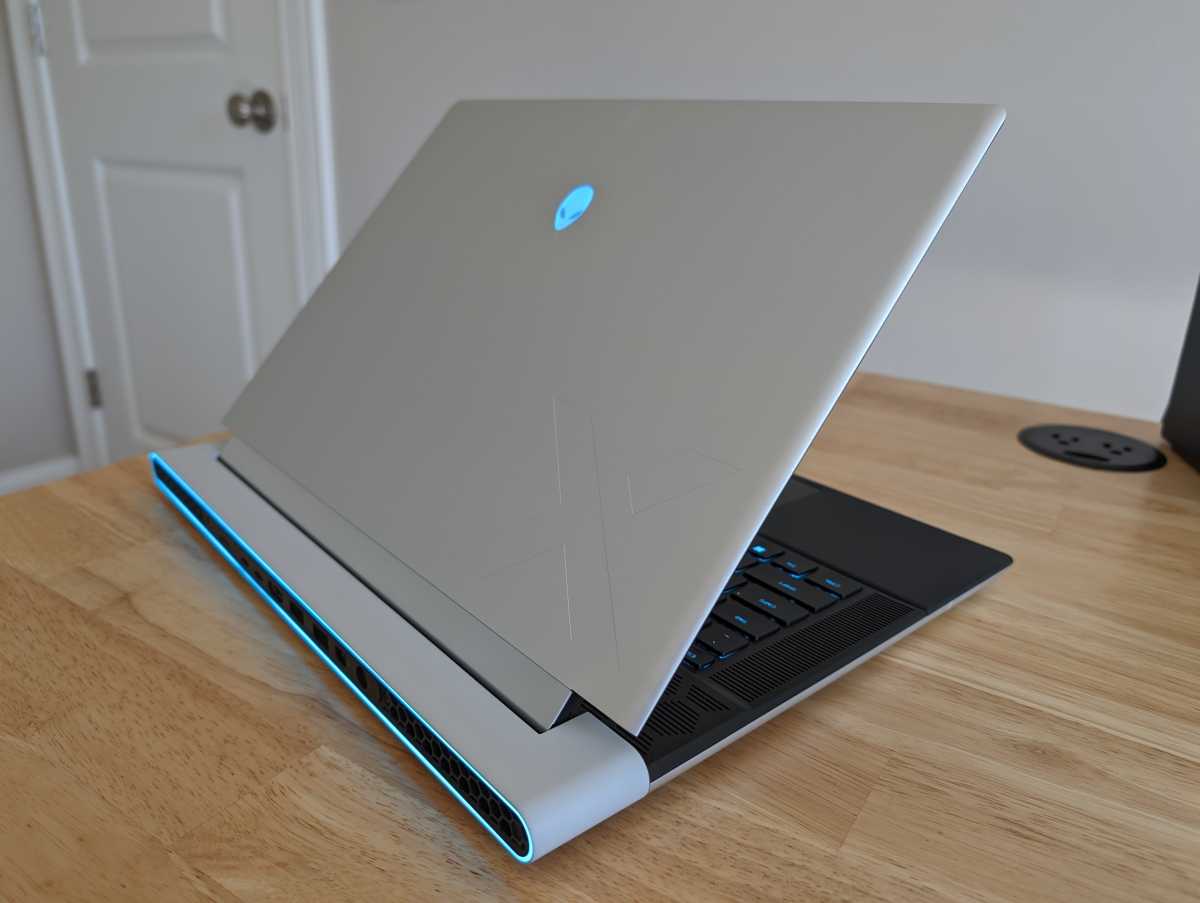
IDG / Chris Hoffman
The Alienware x16 R2 is a well-designed gaming laptop. While it’s a 16-inch gaming laptop weighing in at nearly six pounds, the curved edges ensure it doesn’t look or feel too blocky. Alienware calls the color scheme “Lunar Silver.” The laptop’s lid is silver with a glowing alien head logo you can customize the color of, the inside of the laptop is black, and the back of the laptop — where all the ports are conveniently placed — is framed in white. The design is very Alienware, but it’s polished and not gaudy or over the top — as far as gaming laptops go.
This is a laptop with a full metal chassis. The lid and bottom of the laptop are made from anodized aluminum, there’s stainless steel around the keyboard, and the palm rest is made of a magnesium alloy. It feels nice to hold, and the solid metals give the laptop more of a premium feel than less-expensive gaming laptops that are often just made of plastic. (Plastic is fine and there’s nothing wrong with it, but there’s certainly something that feels high end about a nice metal laptop.)
There’s no weird flex to the laptop’s chassis, and the screen is very solid — it wobbles very little when you adjust its position.
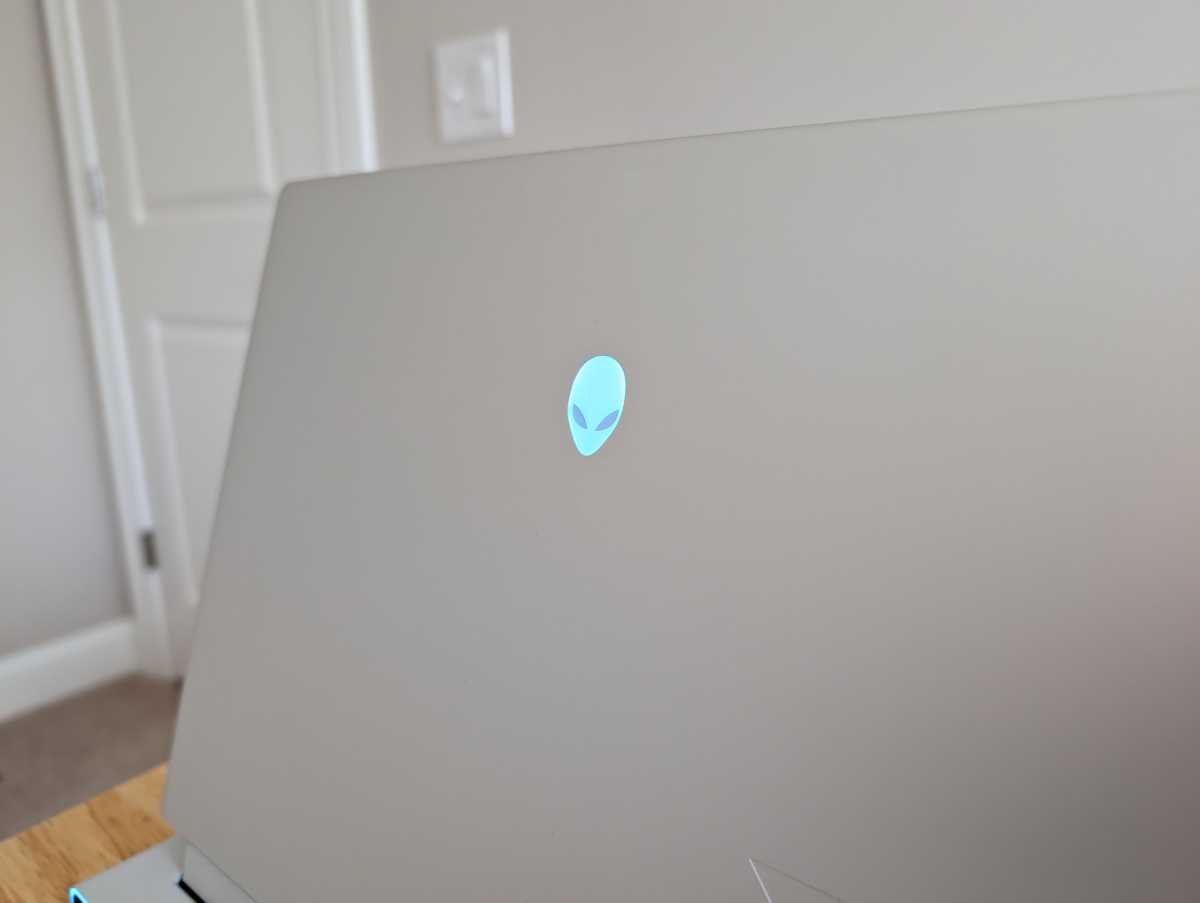
IDG / Chris Hoffman
The LEDs are well integrated: The keyboard offers per-key backlighting, and the entire touchpad’s surface has backlighting, too. (The touchpad backlighting turns on when you’re using it and then fades away a few seconds after you take your finger off of it, so it’s not always distracting.) The alien head logo on the lid is backlit, too.
The back of the laptop also has “stadium” backlighting, with a sleek-looking lightbar around the panel with the ports on the back of the laptop. All this “AlienFX” backlighting is customizable in the included Alienware Command Center software. But, out of the box, everything is a nice shade of blue — no over-the-top rainbow effect the first time you boot it up. (But you can configure it to look like that, if you like!)
It’s also worth noting that the touchpad and “stadium” backlighting on the back of the laptop have “100 micro LEDs,” according to Alienware. This means you can customize them with a variety of different colors and effects — you don’t have to choose just a single color.
Alienware x16 R2: Keyboard and trackpad
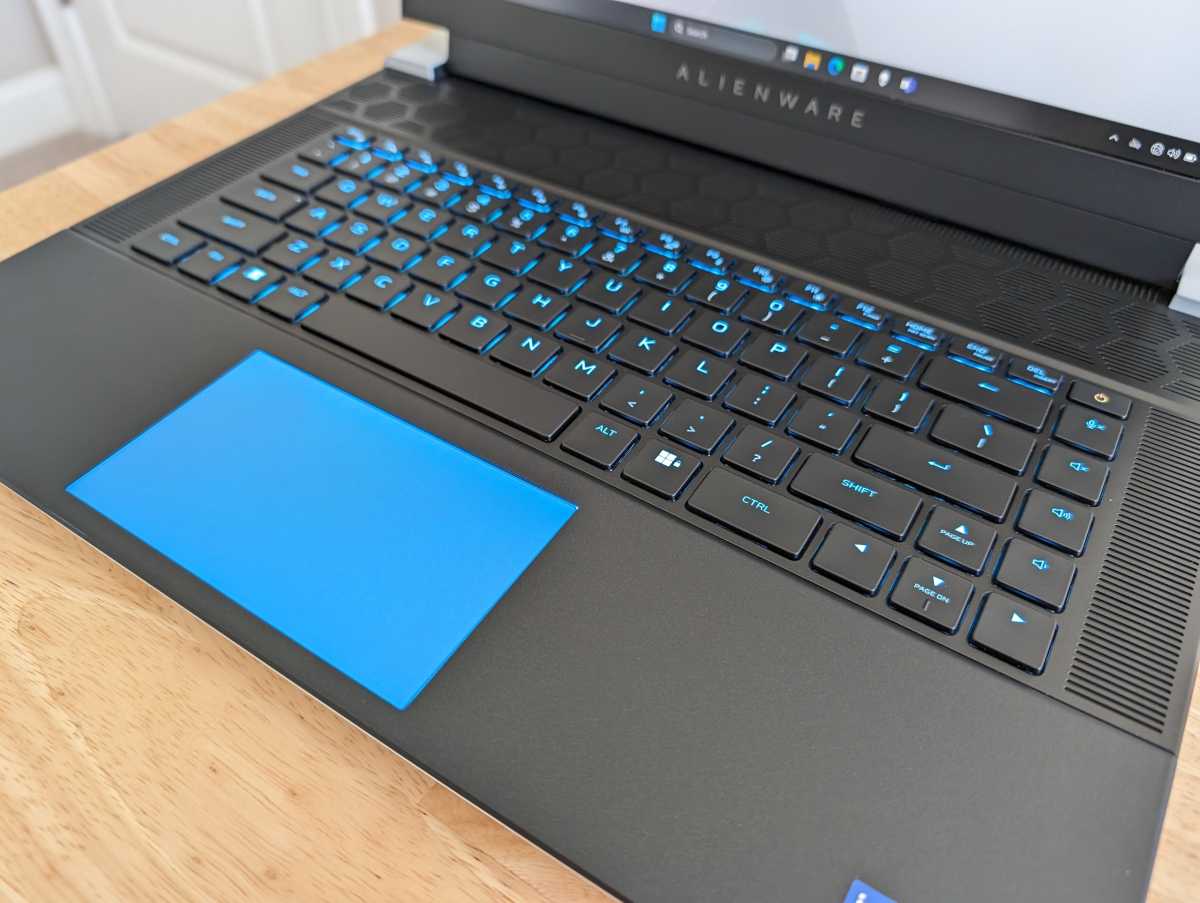
IDG / Chris Hoffman
The Alienware x16 R2 we reviewed had an excellent keyboard. This is no surprise — the model we reviewed came with a mechanical keyboard with CherryMX ultra-low profile switches. Since this is a mechanical keyboard, the keys have a great tactile feel and “clickiness” to them — totally different from the standard keyboards you’ll experience on the average laptop.
Mechanical keyboards aren’t too common on gaming laptops. They’re usually found more on the external keyboards you’d use with desktop gaming PCs.
While I’m a big fan of mechanical keyboards — and so are many other gamers and PC users in general — they’re not a must-have feature. If you’ve never tried a mechanical keyboard, you should give one a try in person to decide how important this feature is to you, since it’s an additional upcharge and not included on the base model.
Mechanical keyboards tend to be on the loud side. While this is fairly quiet for a mechanical keyboard, it’s definitely a bit noisier than the average non-mechanical keyboard. If you’ll be gaming in a quiet room with someone sleeping next to you, the mechanical keyboard version of this laptop probably isn’t ideal. Otherwise, the sound is probably no big deal.
This laptop’s touchpad also feels excellent with a pleasantly smooth surface and good location. I’ve used gaming laptops with larger touchpads, but the touchpad’s size was never an issue — and the compact size ensures palm rejection works well, too. I wasn’t accidentally bumping it while typing.
Alienware x16 R2: Display and speakers
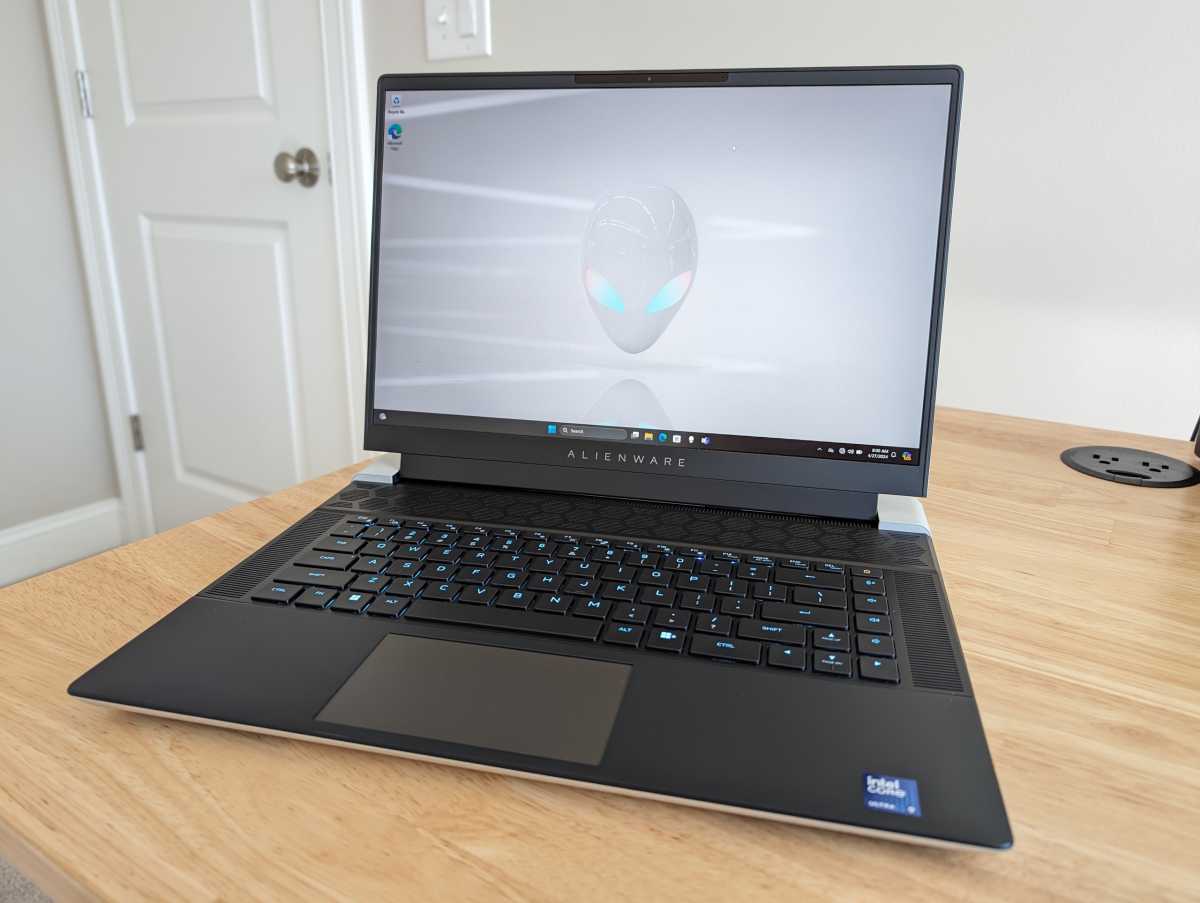
IDG / Chris Hoffman
The Alienware x16 R2 has a 16-inch 2560×1600 IPS display with a 240Hz refresh rate. The display looks good, but there are some things you need to be aware of.
First, this laptop’s display doesn’t have full support for HDR. Alienware says it supports Dolby Vision videos, so that will be nice when streaming Dolby Vision-enabled content. But this is a gaming laptop, and it’s notable that the display does not support HDR in video games.
Speaking of brightness, this display is on the dim side. It offers just 300 nits of brightness. Other high-end gaming laptops — the Asus ROG Strix Scar, for example — offer 500 nits of brightness.
The laptop looked good while gaming. It felt a lot brighter and looked better than the on-paper brightness numbers would lead me to expect. And that 240Hz refresh rate makes for a smooth experience. But the Alienware x16 R2 is definitely behind some of its competitors on brightness and HDR.
The x16 R2’s speakers sound excellent — perhaps the best speakers I’ve ever heard in a gaming laptop. You’re getting a decent amount of bass (for a laptop.) It’s a six-speaker system with two upward-firing tweeters, one on each side of the keyboard. If you plan to do a lot of gaming with the laptop’s speakers — rather than plugging in a pair of headphones or external speakers — you’re getting a worthwhile premium speaker setup with this laptop.
Alienware x16 R2: Webcam, microphone, biometrics
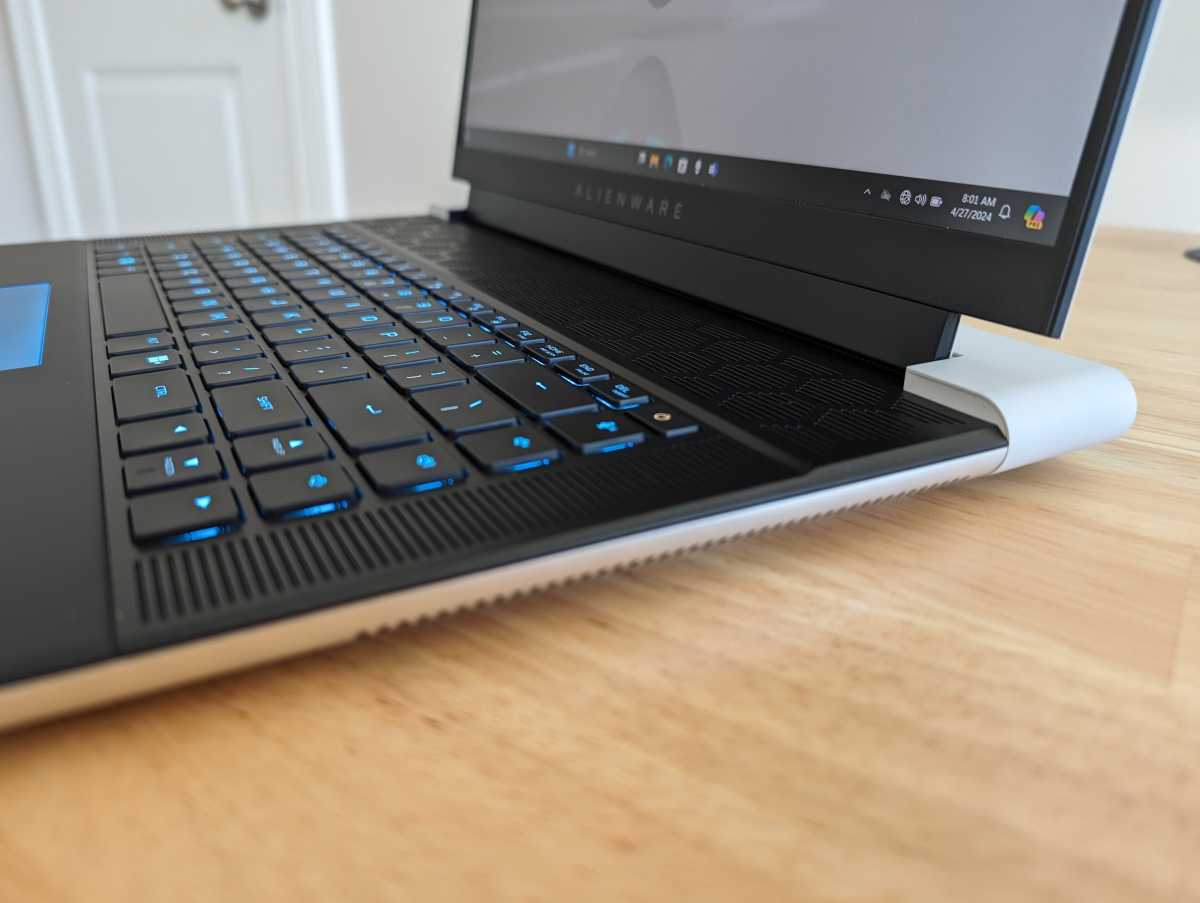
IDG / Chris Hoffman
The Alienware x16 R2 comes with a 1080p webcam with HDR. The webcam looks good — much better than the cheap 720p webcams that are often found in lower-end laptops. Also, thanks to the neural processing units (NPUs) included with Intel’s Meteor Lake chips, you get access to Windows Studio Effects — a suite of AI effects like Eye Contact that makes it look like you’re always looking at your webcam when you aren’t, as well as blurring your background and framing the video around your face.
The dual-array microphones work well for built-in microphones. I still would want to use a dedicated microphone for gaming sessions — especially if you’re blasting sound from those speakers — but the microphone setup is perfectly serviceable for online meetings or for gaming in a pinch.
The Alienware also comes with an IR camera for Windows Hello. It reliably signed me into Windows with my face in a variety of different lighting conditions. It’s a great convenience feature to have, and I missed Windows Hello when I reviewed a gaming laptop without it recently.
Alienware x16 R2: Connectivity
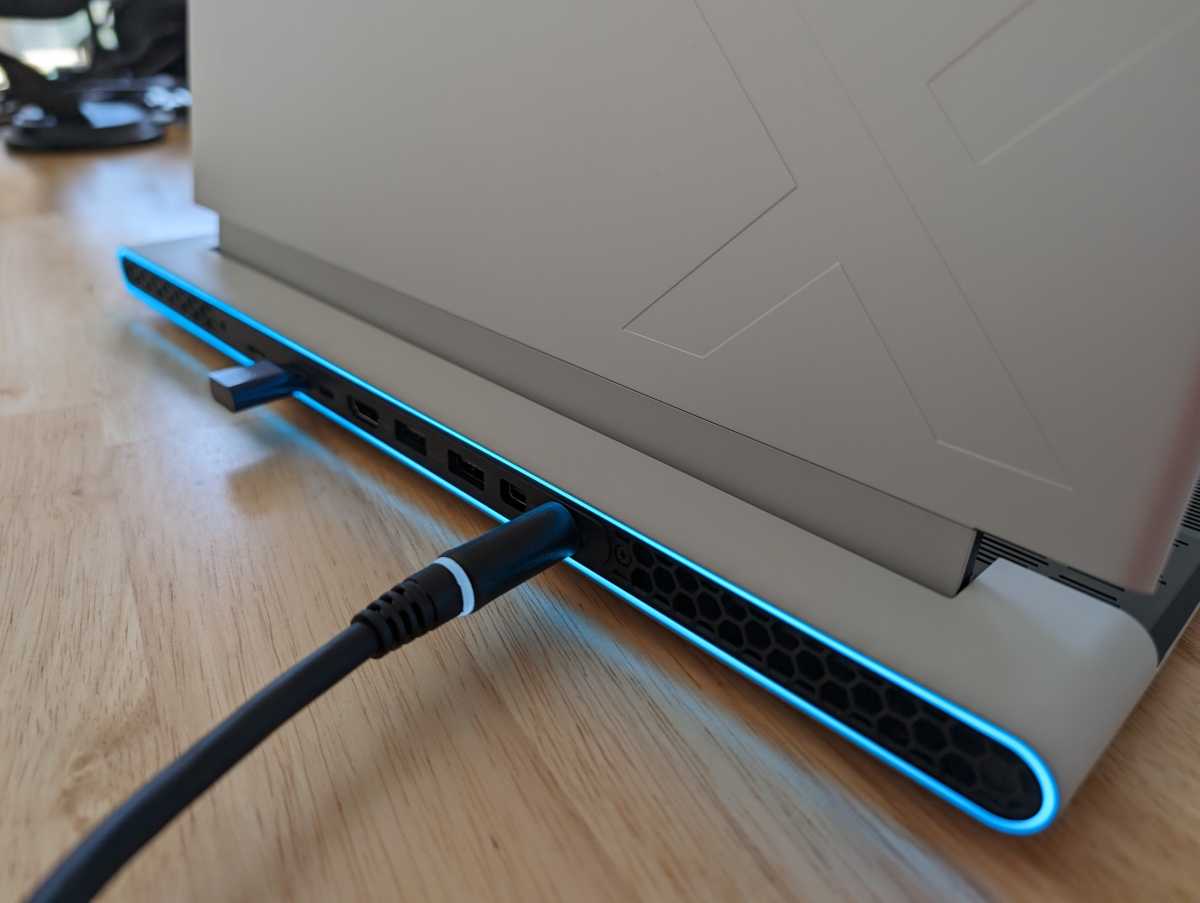
IDG / Chris Hoffman
The Alienware x16 R2 has a rich selection of ports and great connectivity options — with the notable exception of an Ethernet port for a wired network connection, which is a popular feature on desktop-replacement laptops like this one.
All the ports on this laptop are conveniently located on the back of the laptop, ensuring cables aren’t sticking out to the sides of your laptop and getting in the way. Of course, if you’re a fan of USB and headset jacks on the side of your laptop, this may not be the machine for you — but you could always plug in in a USB-C hub or dongle for easier access.
On the back of the laptop, you’ll find a combo headphone jack, a microSD card reader slot, an HDMI 2.1 port, a Mini DisplayPort, and a power jack. You’ll also find a total of four USB ports: This machine has two USB-C ports, one of which is a Thunderbolt 4 port and one of which is a USB 3.2 Gen 2 port. There are also two USB-A ports, both of which support USB 3.2 Gen 1.
When it comes to wireless networking, this laptop is as futureproof as you can get thanks to its support for Wi-Fi 7 and Bluetooth 5.4. You probably don’t have a Wi-Fi 7 router yet, so it’s not essential to have right now — but it means this laptop’s hardware will be ready when you upgrade your router. (Wi-Fi 7 connectivity isn’t available at launch and will be activated later in the year with a software update, according to Alienware.)
There’s one big omission: This laptop doesn’t offer a built-in Ethernet jack for wired network connections. Most gaming laptops of this size offer built-in Ethernet connectivity, but of course not everyone uses it. You’ll need a dongle if you want to connect it to your network via Ethernet — otherwise you’ll just be using Wi-Fi.
Alienware x16 R2: Performance
The Alienware x16 R2 delivered great performance in both gaming and day-to-day desktop use — that’s no surprise thanks to the high-end Intel Core Ultra 9 185H, Nvidia GeForce RTX 4080 graphics hardware, and 32GB of RAM.
I enjoyed playing Cyberpunk 2077’s Phantom Liberty expansion with maxxed-out settings. The Alienware x16 R2 generates a lot of heat, but it has the cooling system to deal with it. Alienware says it has “Alienware Cryo-tech cooling technology,” and whatever it’s called, it worked well. It definitely moves a lot of hot air away from the laptop. The keyboard and other places you’d touch on the laptop stay cool enough that it’s not a problem.
But benchmarks will tell the full story. As always, we ran the Alienware x16 R2 through our standard benchmarks to see how it really performs.
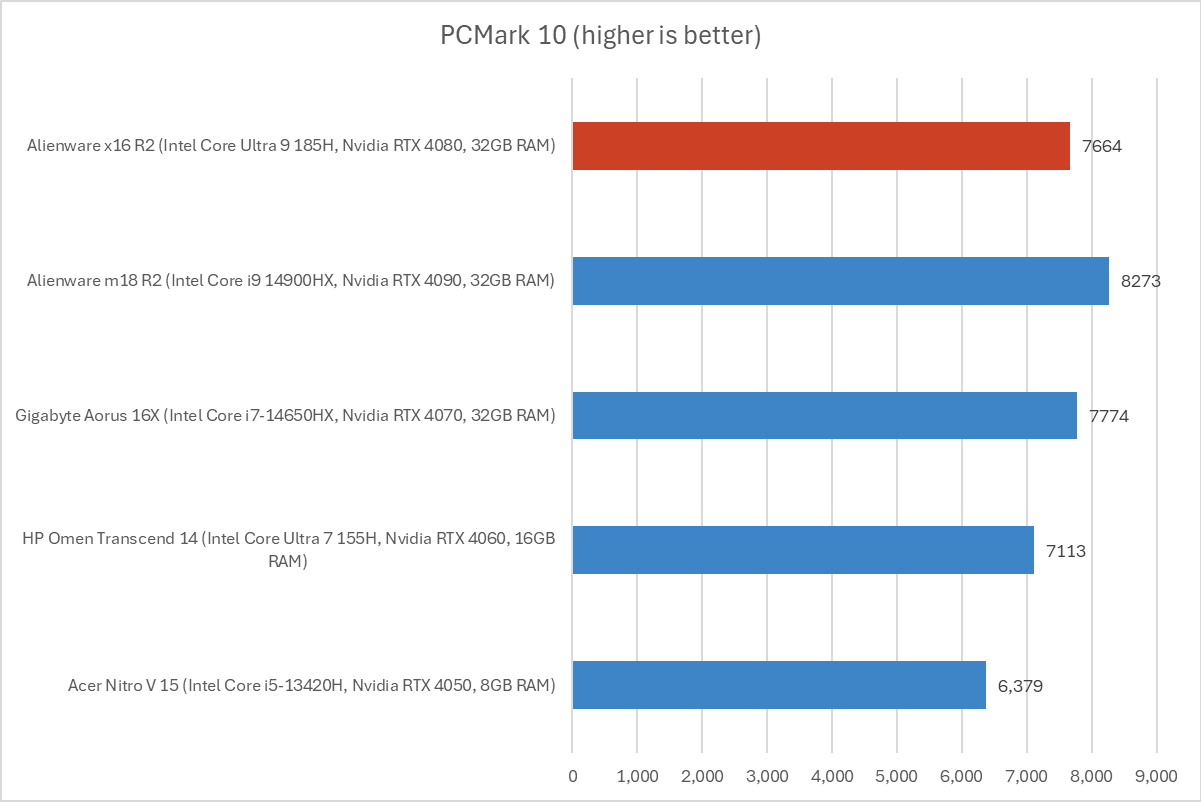
IDG / Chris Hoffman
First, we run PCMark 10 to get an idea of overall system performance. While this is supposed to be an overall system performance benchmark, the CPU has a bigger impact than the GPU here. The 16-inch Alienware x16 R2 delivered a score of 7664.
That’s about what we’d expect to see — Alienware’s 18-inch m18 R2 with its Intel Core i9 185H CPU beats it. The Gigabyte Aorus 16X with its Intel Core i7-14650HX CPU also edges out the CPU in this Alienware laptop, but only by a little bit. Those Intel HX CPUs are delivering slightly better top-end performance than Intel’s latest Meteor Lake CPUs. Meteor Lake CPUs are more focused on power efficiency and AI performance, with their integrated neural processing unit.
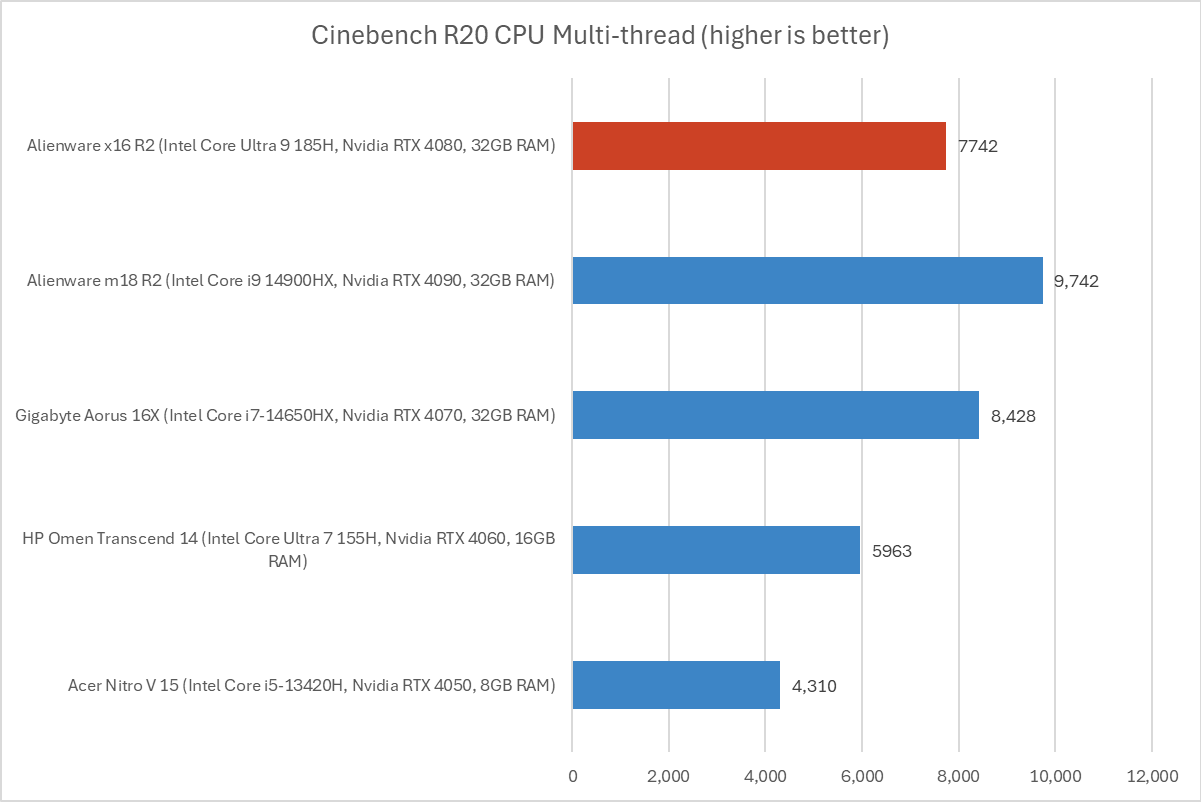
IDG / Chris Hoffman
Next, we run Cinebench R20. This is a heavily multithreaded benchmark that focuses on overall CPU performance. It’s a quick benchmark, so cooling isn’t a huge factor. Since it’s multithreaded, CPUs with more cores deliver more performance and get higher scores.
The Alienware x16 R2 delivered a score of 7742. That’s a few notches below the Gigabyte Aorus 16X. Despite the Aorus having a “Core i7” CPU with a 7 in the model number rather than a 9, that particular CPU outperforms the Intel Core Ultra 9 in this laptop. If top-end CPU performance is what’s important to you, you’ll probably want a gaming laptop with an HX chip.
However, this isn’t representative of real-world gaming performance — these CPU differences don’t necessarily make that much of a difference in games, which are much more about GPU performance. A laptop’s cooling system is also an important factor, as we’ll see below.
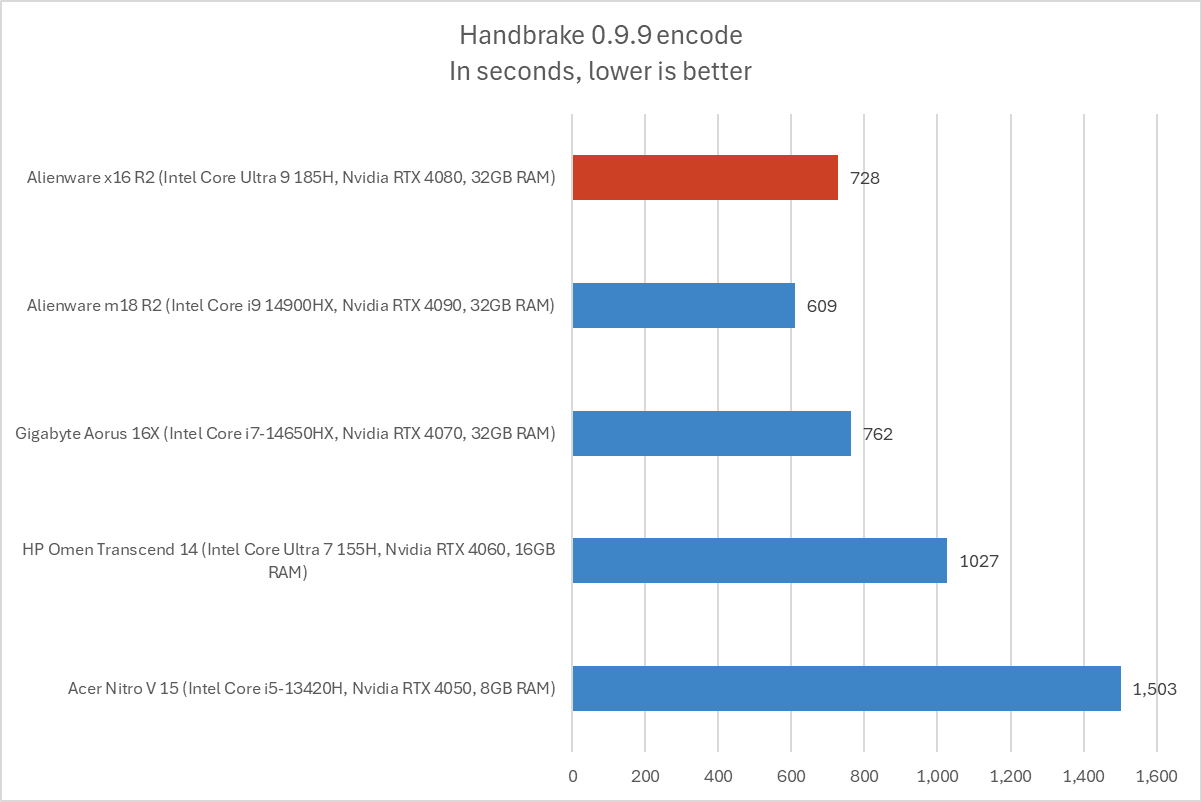
IDG / Chris Hoffman
We also encode a video file with Handbrake. This is another heavily multithreaded benchmark, but it runs over an extended period of time. This demands the laptop’s cooling kick in, and many laptops will throttle and slow down under load.
The Alienware x16 R2 completed our standard encode process in 728 seconds — that’s just over 12 minutes. Interestingly enough, the Alienware x16 R2 outperformed the Gigabyte Aorus x16 R2 that beat it in the Cinebench benchmark. That suggests that the Alienware x16 R2 has a better cooling system that does a better job of keeping its CPU running cool under load, even if the CPU in the Aorus does have higher top-end performance.
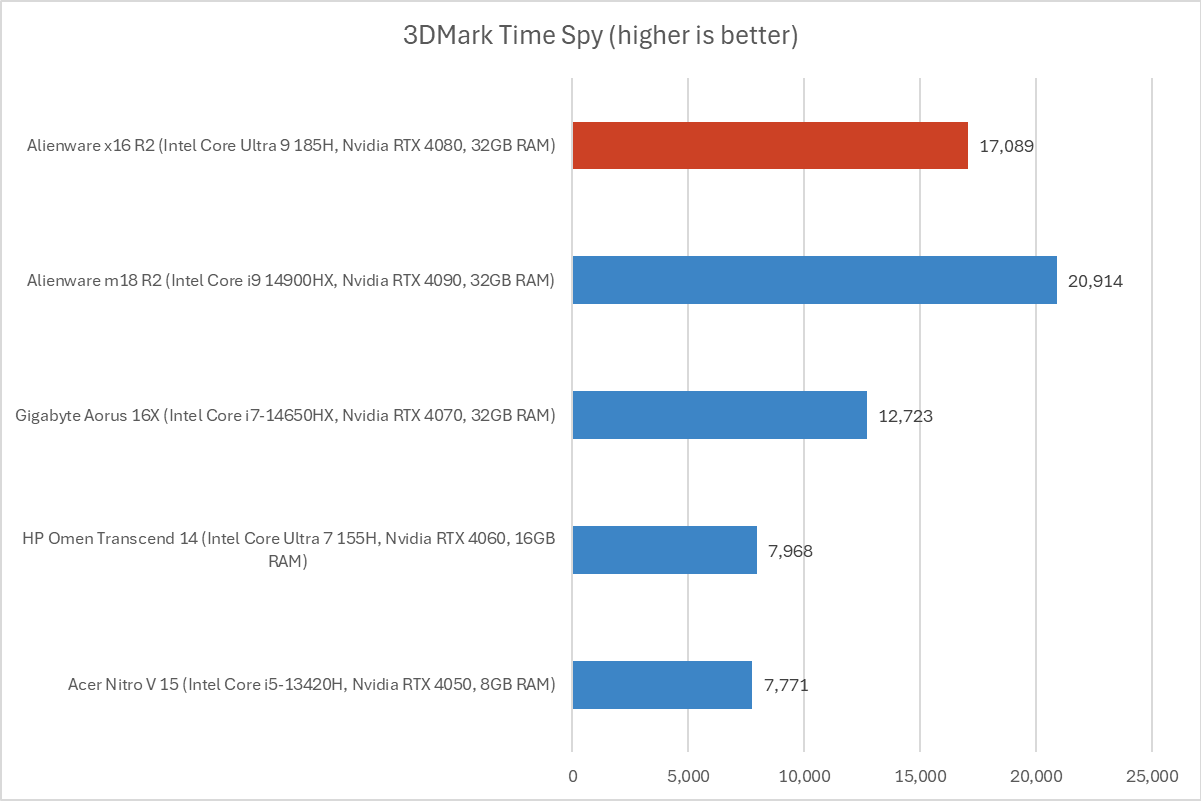
IDG / Chris Hoffman
Next, we run a graphical benchmark — the most important type of benchmark for gauging gaming performance. We run 3Dmark Time Spy, a graphical benchmark that focuses on GPU performance.
The results give us a look at how the different Nvidia GeForce RTX GPUs compare to each other. The Alienware x16 R2, with its Nvidia GeForce RTX 4080 GPU, delivered an average score of 17089. That’s a great score — a no-expenses-spared RTX 4090 is only 22 percent faster here. The RTX 4080 is significantly faster than the RTX 4070 — and much faster than the RTX 4060 and RTX 4050.
Next, we run the benchmarks in some games. First, we use the built-in benchmark in Shadow of the Tomb Raider to test all the gaming laptops we review. It’s an older game, but it’s a great way to compare graphical performance across different PCs.
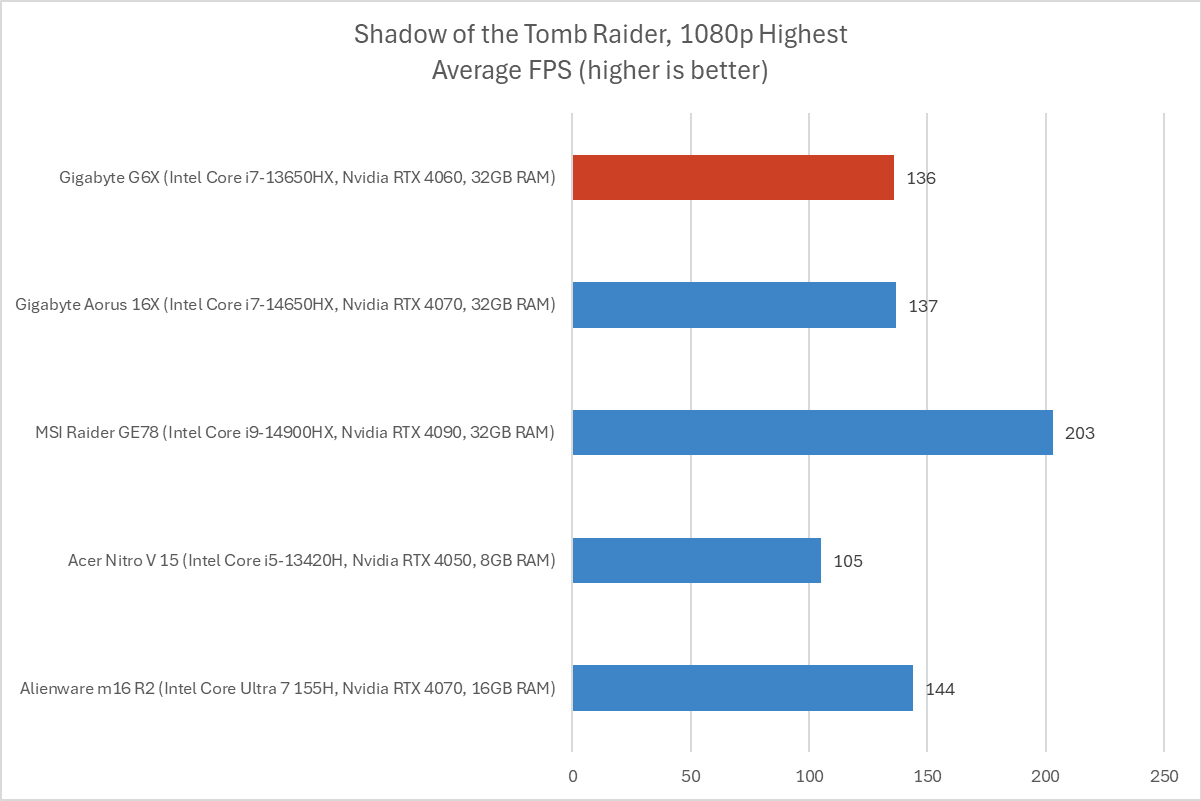
IDG / Chris Hoffman
The Alienware x16 R2 ran the benchmark with an average performance of 166 frames per second. Once again, the RTX 4080 in the model we reviewed was slower than the top-of-the-line RTX 4090, but significantly faster than the RTX 4070.
Finally, we run the built-in benchmark in Metro Exodus. This is a more demanding game, and we set the benchmark to 1080p resolution at the Extreme detail setting.
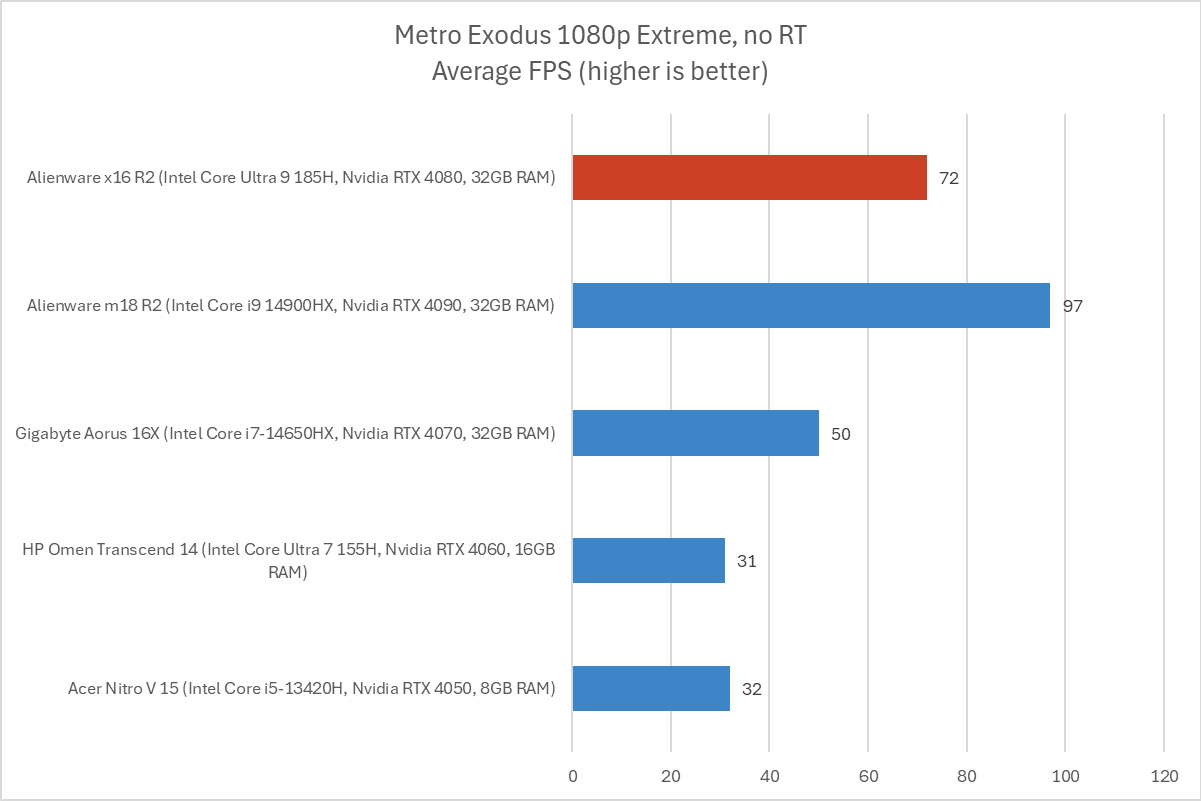
IDG / Chris Hoffman
The Alienware x16 R2 delivered an average FPS of 72. Again, that’s midway between the performance of an RTX 4070 and an RTX 4090.
Overall, the Alienware x16 R2 delivered excellent performance. But this laptop is very customizable, and graphics performance will come down to which GPU you choose to put in your Alienware x16 R2 at checkout.
You may be able to get more top-end CPU performance by opting for a different laptop with an HX CPU instead of a Meteor Lake Core Ultra CPU — but remember that cooling is important, too. A Core Ultra-based laptop like this one may still deliver better sustained CPU performance than an HX-based laptop that has to throttle down to stay cool, as we saw in the Handbrake encode benchmark.
Alienware x16 R2: Battery life
Gaming laptops aren’t known for their long battery life, but the Alienware x16 R2 has a built-in 90 Watt-hour battery. That should deliver decent life — it’s nearly the biggest battery you can get. The largest batteries in gaming laptops top out around 99 Watt-hours, as the U.S. Transportation Security Administration won’t let you take larger batteries on airplanes.
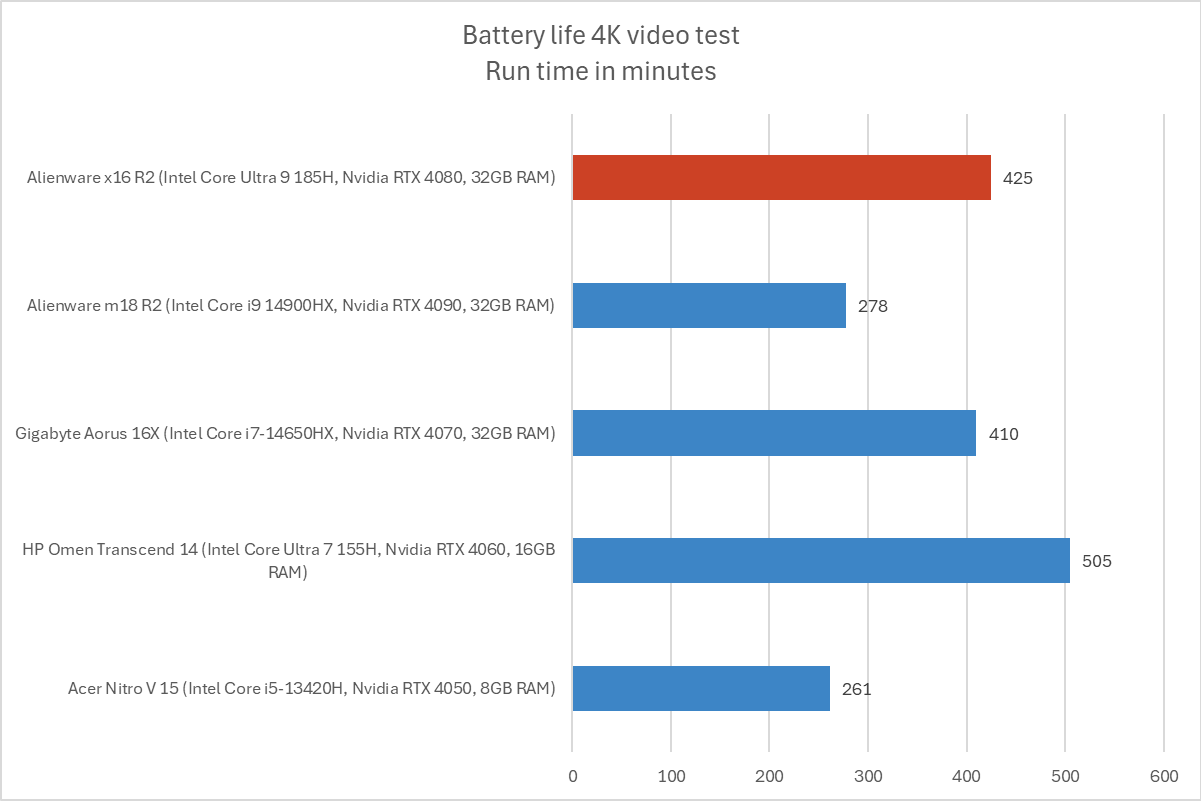
IDG / Chris Hoffman
To benchmark the battery life, we play a 4K copy of Tears of Steel on repeat in the Movies & TV app on Windows 11 with airplane mode enabled until the laptop suspends itself. We set the screen to 250 nits of brightness for our battery benchmark. This is a best-case scenario for any laptop since local video playback is so efficient. Bear in mind that real battery life in day-to-day use is always going to be less than this as you use various applications.
The Alienware x16 R2 delivered surprisingly good battery life for a 16-inch gaming laptop, running for an average of 425 minutes — that’s just over seven hours. It lasted 15 minutes longer than the Gigabyte Aorus 16X, despite that laptop having a larger 99 Watt-hour battery. This may be down to the difference in CPUs — as mentioned, the Meteor Lake-based Core Ultra CPU in this laptop is more focused on power efficiency than those HX CPUs, which are more focused on top-end performance.
It’s a great result for a gaming laptop. You aren’t going to be using this laptop away from an outlet for an entire eight-hour workday, but you have plenty of battery life to go for hours away from an outlet when you need it. (Bear in mind that all gaming laptops run games slower when they aren’t plugged in, so you’ll want to plug into an outlet to play games, anyway.)
Alienware x16 R2: Conclusion
The Alienware x16 R2 is a polished 16-inch gaming laptop with a good-lucking design, a nice all-metal chassis with great build quality, lots of customizable LEDs, and a collection of ports smartly placed on the back of the laptop. The mechanical keyboard on our review model felt great, too. It’s also very customizable with a wide range of different CPU, GPU, RAM, and storage options, and the configuration of our review model delivered great performance with excellent cooling.
There are a few weak points: You’ll find brighter displays elsewhere, and the lack of HDR support within games does feel like a shame at this high price point. Neither are deal-breakers, but they’d be nice to have upgrades on a premium gaming laptop. Additionally, if you want to use an Ethernet cable with your laptop, you won’t find that here — I know that will be a deal-breaker for some people.
Our review model was $3,199, so we’re definitely not in budget gaming laptop territory here. But the machine we reviewed was a high-end gaming laptop with an RTX 4080, mechanical keyboard, all-metal chassis, impressive speakers, and unusually long battery life for a gaming laptop. You’re paying extra for these things.
The base model starts at $2,099, which is a much lower cost than the model we reviewed— but you’re getting a Core Ultra 7 CPU, RTX 4060, 16GB of RAM, and no mechanical keyboard. These prices do feel a little high, and I expect you can save hundreds of dollars by choosing a less expensive gaming laptop with similar hardware — perhaps even an Alienware m16 R2. Those less-expensive laptops will probably be made of plastic instead of metal, though — and I don’t think their speakers will sound anywhere near as nice either. (Still, they may have brighter displays!)
Overall, the Alienware x16 R2 is a premium product at a premium price point, and that’s mostly what you’re getting — but it would be nice if that display had premium-level brightness and HDR support, too.



